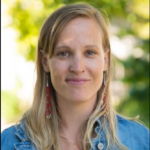Interview with Student Sara E. Cannon
 Sara E. Cannon, a UBC PhD candidate in the Department of Geography and the Institute for Oceans and Fisheries who participated in the Lind Seminar (GPP 591) in 2019 focused on the theme, “America and the Climate Crisis”, has published an article, Climate change denial and the jeopardised interest of the United States in the Freely Associated States of Micronesia, in Asia Pacific Viewpoint 2020.
Sara E. Cannon, a UBC PhD candidate in the Department of Geography and the Institute for Oceans and Fisheries who participated in the Lind Seminar (GPP 591) in 2019 focused on the theme, “America and the Climate Crisis”, has published an article, Climate change denial and the jeopardised interest of the United States in the Freely Associated States of Micronesia, in Asia Pacific Viewpoint 2020.
We at the School of Public Policy and Global Affairs (SPPGA) wanted to learn more about her research in climate change denial and how the Phil Lind Initiative seminar influenced her research pursuits. Please find an interview with Sara below.
SPPGA: Could you please describe who you are and what you are currently studying?
Sara E. Cannon: I am a PhD candidate in the Department of Geography and the Institute for Oceans and Fisheries. I study coral reef ecology, resilience, and decolonial approaches to marine resource management and conservation, in the Micronesia region of the Pacific Islands.
SPPGA: Why did you apply to the 2019 Phil Lind Initiative Seminar, focused on “America and the Climate Crisis”, delivered by the School of Public Policy and Global Affairs at UBC?
Sara E. Cannon: I’d actually completed my required coursework when I saw the course advertised, but I wanted to take it anyway because it was such a huge opportunity to learn from some of the U.S.’s most influential thinkers in climate policy and justice work!
Climate experts widely consider people living in Micronesia among the most vulnerable communities to the impacts of climate change in the world, but as I discuss briefly in the paper, Micronesian people contribute almost nothing to global greenhouse gas emissions. There is a huge justice component to the work that Pacific Islander communities are doing in response to climate change, including their work to conserve coral reefs, which could play an integral role in protecting low-lying islands from erosion in the future. I wanted to learn more about the ways that the actions (or lack of actions) taken by the U.S. in response to climate change impact people living in the Pacific Islands.
That said, what I found most valuable about this opportunity was the chance to meet with, talk to, and be inspired by experts who have been doing integral climate justice work and organizing for much longer than I have. Sitting in a room and having a conversation about climate change and justice with people like Robert Bullard, Winona LaDuke, Elizabeth Kolbert, and Bill McKibben was powerful. It humanized these people that I’d read about for years, and I appreciated that we were able to learn from a diverse group of academics, activists, writers, and intellectuals, who all used different ideas and tactics to address various aspects of climate impacts in the U.S.
SPPGA: What were some of the impacts of your participation in the Lind Initiative Seminar on your research?
Sara E. Cannon: I have a much more holistic understanding of the ways that climate actions (or lack thereof) in the United States can and do have a direct influence on people’s lives all over the world, especially in the places where I work. This has changed the ways I look at the current environmental challenges people in Micronesia are facing today.
I came to understand how history is important and can actually dictate how communities experience the effects of climate change today. For example, Robert Bullard talked about this in relation to environmental justice in the United States. Racist urban planning policies forced Black and other people of colour in the United States to live in the most ‘undesirable’ parts of cities, which are now being impacted disproportionately by climate change, making those communities more vulnerable to climate impacts. A similar thing happened in Micronesia, where actions that were taken by the U.S. during colonialism still influence people’s abilities to adapt to climate change today. Those actions, which can date back a hundred years or more, also continue to influence the health of coral reefs, which in turn further affects local people. Linking the current state of coral reefs to these colonial histories is a part of my current PhD research.
In my experience, most marine scientists do not consider the local historical context of environmental degradation in our work, and conservation scientists more broadly often assume that a degraded ecosystem has gotten to that state because of mismanagement, which unfairly puts the blame squarely on local communities. It is then easy to assume that local communities should have to carry the burden to fix degraded ecosystems, despite the fact they may not have the resources necessary to do so. The historical context makes it clear that it is unethical to force people in Micronesia to pay the price for actions taken by the U.S. without their consent. It also shifts the responsibility for conserving and managing ecosystems to one that we can at least help to carry, by holding the U.S. and other colonial powers responsible for their role in creating and perpetuating the current challenges facing people in Micronesia today.
SPPGA: We hope that you will continue to see success in your research publishing stories on climate change. Thank you for sharing your publication and responses with us!
